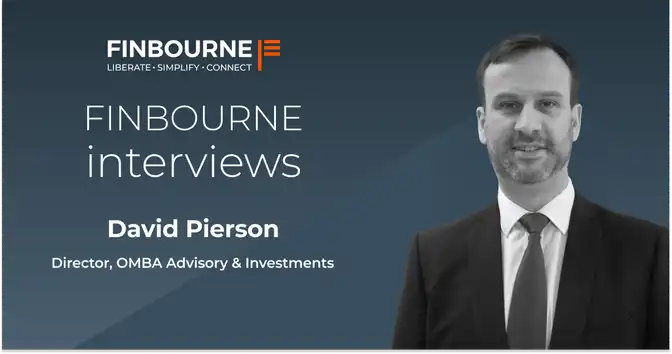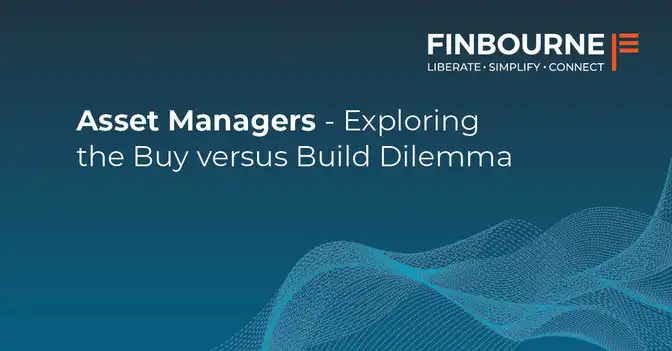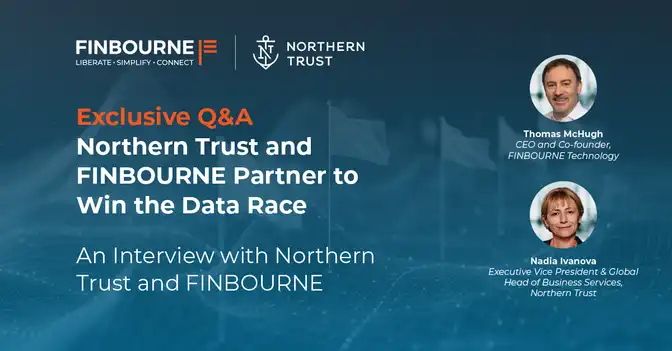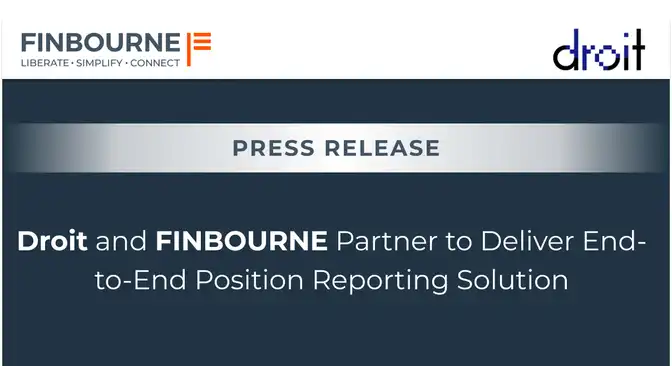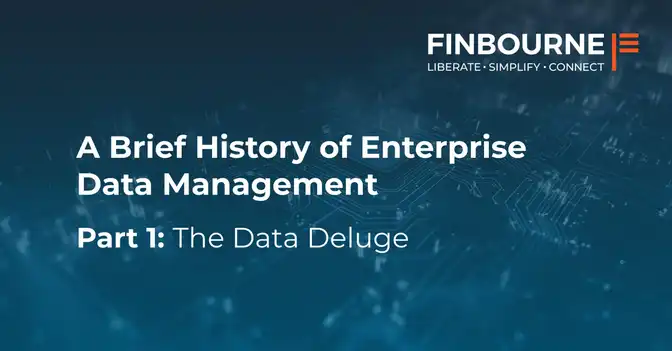In the first of our FINBOURNE interviews series, Dermot Shortt, FINBOURNE Chairman sits down with David Pierson, Director, OMBA Advisory & Investments. They discuss OMBA’s relentless focus on efficiency and automation in building a low fee scalable business which grew revenue by 670% last year, the industry challenges he sees around data quality, how OMBA is tackling the investment platform problem, and solving build versus buy.
David is one of those rare finds – a technologist who is just as comfortable engrossed in the detail as he is in the big picture strategy. A stint as a Programme Manager at the European Bank for Reconstruction and Development (EBRD) and five years at Barclays Wealth gave him first-hand experience migrating software systems and leading change projects. His hard-won expertise drives him at OMBA today where he is responsible for all aspects of operations, technology and adherence to the fund’s multi-jurisdictional compliance requirements.
Key facts about OMBA:
- Launch date: 2017
- Clients: OMBA offers discretionary investment management services to high net worth clients and family offices as well as acting as investment manager to its UCITS fund.
- Technology: OMBA operates a cloud-first strategy and runs ‘serverless’ using Microsoft Azure and other leading software platforms
- Mission: OMBA operates a low fee model: its investment management fee is capped at 30 basis points of AUM.
Dermot: So, David, what are the most pressing technology and operational challenges facing OMBA right now?
David: When we started OMBA in 2017 we weren’t encumbered with any legacy systems or large-scale technical debt. We had an opportunity to design a modern operating model securely based in the cloud with services like Azure, Office 365, Microsoft Dynamics for our CRM, and Adobe Sign for onboarding for example. We are licensed by the FCA to manage and advise money for retail and professional clients, but we don’t hold clients’ assets, so we are not responsible for heavy lifting Operational tasks like custody and settlement. However, as we do not have the operational control over some of the back-office processes, we are at the mercy of the data we receive from the 10 different banks and custodians we work with. We have built our own systems that receive daily feeds from these banks, but we often face challenges around data quality, for example trade execution and settlement issues. During the shift to working remotely, we have certainly seen some of the challenges that the larger banks experience as they may have legacy apps that don’t port as well over VPNs and we experience the knock-on effects of issues.
Dermot: When you started the business how did you decide which approach to take out of these three – a.) build an in-house tech outfit, b.) outsource everything or c.) be a hybrid with a small tech team that will buy in 3rd party products and make them talk to each other?
David: We certainly grew into that third category. We were frustrated with some of the initial technology platforms we reviewed which weren’t meeting our core requirements. Ideally we were looking for an open front to back system that could do CRM, portfolio rebalancing, client and performance reporting and regulatory reporting. We must have looked at about 10 different providers and we were battling to find one provider who could adequately meet all of these requirements. After about three months of this, we actually went down this hybrid build versus buy route – we decided to buy the highly commercial and easily producible systems such as Performance and Accounting systems and then we developed the highly specialised components such as data ingestion and trading system we really needed to run the business so we had control and ownership over them.
Our vision is to continue to have a central point – let’s call it ‘books of record’ and as the business evolves over the next few years, and our technology needs change and mature having built this open architecture with the flexibility of a data point or API’s we can continue to integrate products as we need to the core books & records system.
Dermot: You talk about dividing technology between the systems you would buy off the shelf and what you would build in house. What should smaller asset managers be building themselves?
David: For us, it was very much driven by cost and functional fit in the early days. We have a lot of sophistication within our trading models so our approach has been to buy the commoditisation, for example, the CRM, the regulatory reporting, the performance engine – the well-established very commodifiable set of functionality that would be difficult to build and would likely only benefit from a small uplift in functionality should we have built it ourselves. Instead, we ‘own’ all of the data layer and some of the areas around trading and operational scale: Anywhere where we can build efficiencies in working to a common set of data and processes. We also commoditise things like industry leading Two Factor authentication and authorization, and certain security and User Interface frameworks. Broadly, it’s about looking at our roadmap and thinking about when we may move some functions from in-house build to outsource buy and asking the question around what we will own in two years versus what we’ll outsource. They are the questions to have in your early years as an asset manager as you balance the needs of the business with start-up costs.
Dermot: How do you see technology as a driver for increasing revenue, improving operational performance and reducing risk?
David: Our business is built on the belief that many firms in the investment management industry has charged very high fees for lack lustre performance over the years. Consumers are becoming savvier with respect to fees and value for money and more aware of the rise of passive products and cheaper investment alternatives so the only way we can scale and run a business efficiently and profitably is with a relentless focus on efficiency and automation.
We had to invest in technology that freed up our team to focus on investment and client focused tasks and then build systems for all the other tasks so we didn’t end up with large offshore teams performing manual or inefficient tasks. Examples of where we have used technology efficiently are implementing digital onboarding, large scale automation of operational tasks such as MiFID reporting, trade matching, and implementing RPA for some unavoidable click-based tasks. Our results speak for that – revenue grew 670% and costs only increased 20% in 2019 and for 2020 we’re looking at more 100% growth in revenue with a 60% increase in costs as we invest in more sales people. Whilst we wouldn’t label ourselves a pureplay fintech business the only way we can scale a business at 30BPS is through technology so we can keep human capital dedicated to delivering solid investment performance and servicing client needs.
Dermot: Looking out 3 to 5 years, beyond the obvious trends, what do you think will be the next big change in the fund industry?
David: In 2020 it still feels strange we are still talking about digital transformation as that should be a given but there is still the on-going need to digitise legacy systems in larger organisations. Outside the well-known trends of fee compression, manager consolidation, increased focus on ESG and growth of the passive and ETF industry, we are seeing a move away from on-prem hosted solutions towards the cloud as larger organisations become familiar and comfortable with operational and security aspects.
Data quality is becoming even more important. It was traditionally seen as an operational nuisance at the end of a project when you would do a large scale clean up but with the move towards API-based platforms such as LUISD which help consolidate fragmented systems they are only as good as the data you provide. At OMBA, data quality is a core focus for us. We have data owners and data stewards who make sure every piece of data is checked against a set of rules and cleansed so that poor quality data is not allowed to build up over the years. This means when we do come to do a large-scale system migration in a few years we shouldn’t have to navigate a huge amount of data problems .
We are also seeing the growth of off-exchange dealing platforms such as Tradeweb really challenging the market. For our dealing process we can go straight to an authorised participant and avoid the traditional broker fees (anything from 2 – 25 basis points) and pass these savings directly on to our clients.
Dermot: What can the investment industry learn from the b2c technology industry?
David: It’s a good question as the investment world often seems to be playing catch up! To be fair some of that is driven by financial institutions being heavily regulated so that they tend to be more cautious and are also often disadvantaged by legacy systems which are slow and difficult to change. That said there a lot of lessons that can be learnt such as from fintech companies who have revolutionised the onboarding process. I think the real focus and learning is that of simplifying and improving the customer experience.
Within the technology space I also think investment firms can learn from genuinely Agile firms. Use of Agile doesn’t just involve dragging a whiteboard into the room and there is a lot the investment industry can learn about truly flattening an organisation. In many instances the change team are often far removed from the end customer who will be impacted so it’s difficult to advise on the change required. So instead of the typical big bang approach to change where the projected benefit is often no longer there upon project completion, it’s far more effective to break it off into smaller pieces and shorten the release lifecycle where possible.
Dermot: What are some of the main benefits of being such a nimble organisation?
David: We can certainly respond to change very quickly. It is a lot easier for us to review, trial and implement a new technology and do all sorts of A/B testing as we don’t have to go through multiple levels of approval and the business teams are receptive to change. It’s definitely an advantage but moving so quickly certainly has to be weighed up against the security and compliance needs when doing so.
Dermot: What key skillsets will you look for as you scale your team in ops and technology?
David: It’s hard to pin down a specific set of exact skills as technology is constantly changing – the Python coders of today were perhaps not around five years ago. We look for people who are technically proficient and have strong technical discipline skills. Whilst it sounds a cliché, we place a large focus on the attitude and not solely the skills. So for OMBA, that is somebody who is curious, client-centric, buys into the vision and mission of the business, and someone who delivers at a high quality. For me, I always look for people who have run personal projects and those actively involved in a technical framework or open source project and interested in technology outside of just their career.
You can find out more about OMBA and its approach to technology here: https://www.ombainvestments.com/about/technology/
Our next FINBOURNE interviews article is with the Chief Operating Officer and partner at a London based quant-equity fund.
